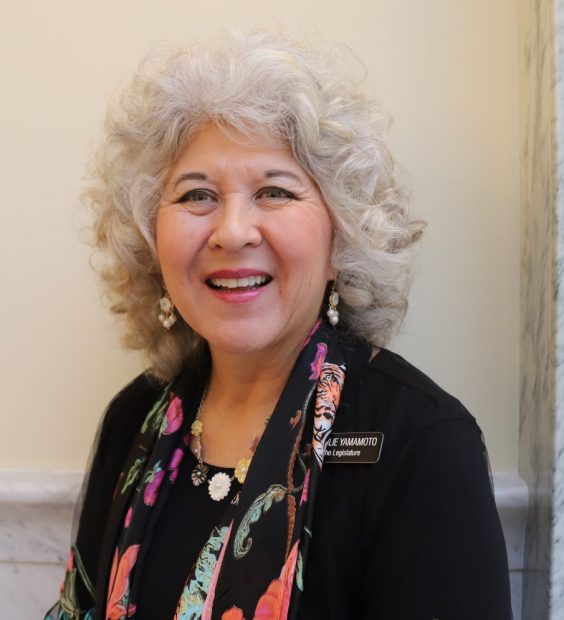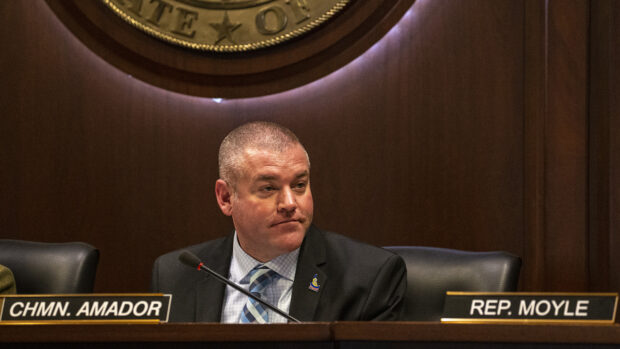School districts soon could be barred from mentioning state tax relief that’s not “guaranteed” in bond and levy ballot measures. The Senate State Affairs Committee endorsed House Bill 574 on a party-line vote Wednesday.
School districts are seeing an influx of cash from last year’s House Bill 292, a sweeping property tax relief bill that helps schools pay down bonds and levies. Some GOP lawmakers bristled when districts mentioned the new income in bond and levy measures proposed in November.
“We saw that certain schools are saying, ‘If you pass this, your rate will go down because of the state funds,’” said sponsoring Rep. Kevin Andrus, R-Lava Hot Springs. “This is all about transparency and making sure that people are aware of what they’re voting for.”
The Idaho School Boards Association opposed the bill. Districts already face “cumbersome” ballot language restrictions, and this bill would effectively bar districts from disclosing tax relief income in election communications, said Quinn Perry, the group’s deputy director. “It is impossible to give a guaranteed amount for any state tax relief funds.”
A few people testified in support of the bill Wednesday. “We face the possibility of being taxed out of our home when the school districts use these deceptive methods in order to make these bonds look like they’re almost free,” said Halli Stone of Idaho Falls.
The bill now heads to the Senate, after already clearing the House.
Cottages could alleviate housing waitlist at ISDB
Students from across the state come to the Idaho School for the Deaf and the Blind — and dozens live in cottages on the Gooding campus.
But the cottages are full and the on-campus program has a waiting list. A $6 million budget line item could change that.
The Permanent Building Fund’s budget proposal includes the money to build two new campus cottages, which would house about 20 students each.
“Once they’re built and staffed, the waitlist would be gone,” said Brian Darcy, administrator for Idaho Educational Services for the Deaf and the Blind.
The cottages house out-of-town students who live on campus during the week. But many students live off campus. Families frequently move to the Magic Valley, so their children can take a bus to their daily classes, Darcy told the Joint Finance-Appropriations Committee Wednesday.
All told, 134 students attend on-campus programs in Gooding, up from 93 students five years ago. Meanwhile, statewide outreach programs serve 2,476 students, compared to 2,039 students five years ago.
JFAC will consider the Idaho Educational Services for the Deaf and the Blind and Permanent Building Fund budget bills in the next few days.
House Education steps up push for higher ed salaries
The House Education Committee wants to see the state put additional dollars into higher ed salaries.

House Education Chairman Julie Yamamoto made a push Wednesday for a 4% boost in college and university salaries — fully funded by the state.
This request would help bridge some of the gap between what the colleges and universities pay to retain staff, and what the state covers with tax dollars, Yamamoto, R-Caldwell, told the Joint Finance-Appropriations Committee.
JFAC is building state budget bills around 3% pay raises: a 1%, across-the-board raise, and a 2% merit raise. To further complicate matters, the state hasn’t fully funded higher ed pay raises in the past, requiring colleges and universities to use tuition and fees to cover the balance.
House Education wants JFAC to fully fund all higher ed raises, Yamamoto said. Bumping the higher ed pay raise from 3% to 4% would cost about $4.1 million, she said.
House Education discussed higher ed salary issues at length Tuesday, with lawmakers of both parties saying the state should do more to cover employee salaries. But Yamamoto said she hadn’t heard from her entire committee about the 4% proposal; she said she emailed the idea to the panel late Tuesday afternoon.
JFAC is expected to finish the higher ed budget in the next few days. That budget bill would likely address pay raises in some form.
Senate approves funding for library programs
The Senate approved funding for two state library programs that pay for summer science classes and digital access grants.
The Senate already approved a $6.6 million maintenance budget for the commission. Wednesday’s budget bill covers what lawmakers are calling “enhancements,” or line-item requests for new and ongoing program funding.
The Idaho Commission for Libraries enhancement budget totals $842,500. That includes $750,000 for the Digital Access for All Idahoans grant program, $40,000 for the Summer STEM program and $52,500 for 2% employee merit raises.
The enhancement budget bill now heads to the House.
Charter commission: Amador appointment gets a brief hearing
A former House member had a tame time Wednesday afternoon at the Senate Education Committee.

Paul Amador appeared for a short confirmation hearing, for a short-term appointment to the Idaho Public Charter School Commission. Amador, of Coeur d’Alene, was appointed in November. His term ends in May, but his appointment is still up for Senate confirmation.
Amador addressed the perennial question about the commission’s role — whether the group should serve as advocates for the charter sector, or regulators for the state’s growing number of charter schools. He reframed the question in terms of what is best for students. At times, the commission should advocate, and at other times, the commission’s job is to ensure accountability.
The commission authorizes 60 of Idaho’s 74 charter schools.
Amador did not say whether he would seek another term on the commission after May, saying the decision falls to Gov. Brad Little’s office. “I guess maybe they’re giving me a trial run.”
Similarly, Amador was noncommittal about his political plans. He served in the House for six years before losing in the 2022 Republican primary to current state Rep. Elaine Price. Amador said he hasn’t ruled out another run.
The candidate filing period opened Monday and ends March 15.
Senate Education will likely vote next week on Amador’s appointment, sending a recommendation to the full Senate.
Senate clears IRI exemptions, driver’s education bills
During an evening session Wednesday, the Senate passed two education-related bills.
House Bill 566 would waive reading the Idaho Reading Indicator test for up to 1,400 English language learners.
House Bill 531 would allow parents, who have a valid driver’s license and live in rural school districts, to be private driving educators for their children.
Both bills head to the governor, who can sign them, veto them or allow them to become law.
